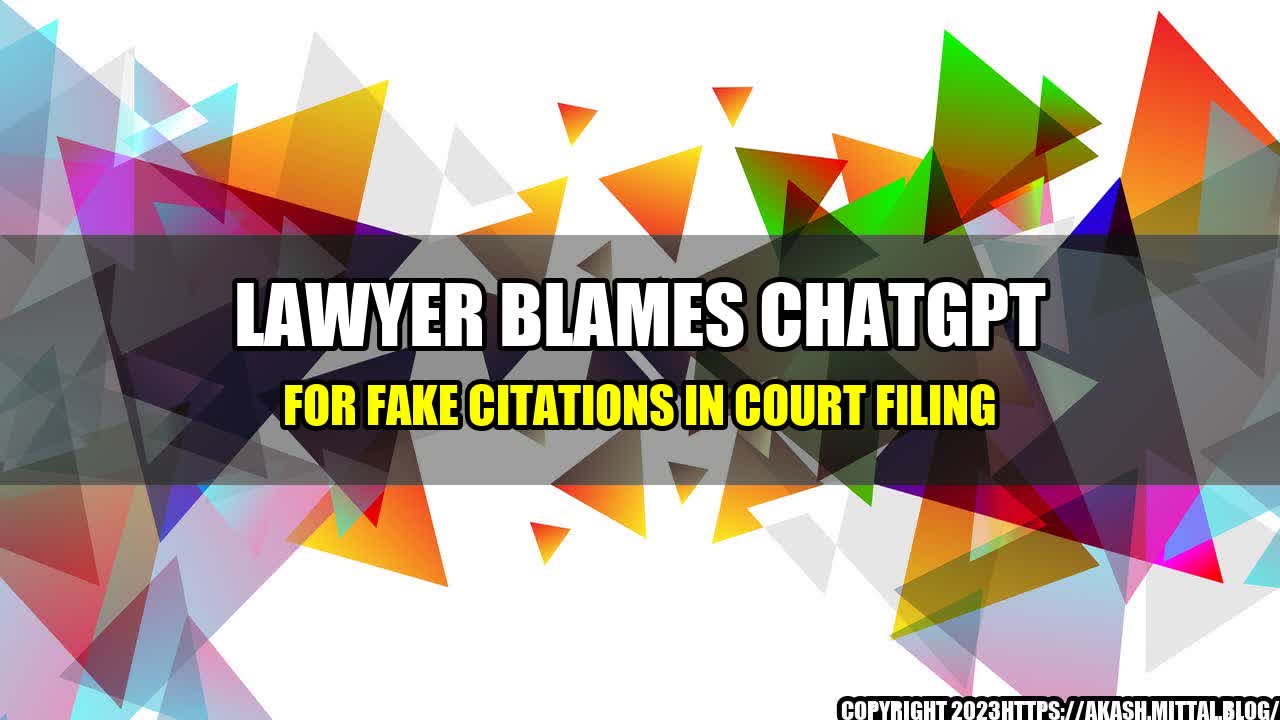Lawyer Blames ChatGPT For Fake Citations In Court Filing

It was just another normal day of work for John, a lawyer in a prominent law firm. He had to submit a court filing for one of his cases the next day and he was working late to finish it. However, what he did not know was that he was about to become a victim of an artificial intelligence chatbot.
John was searching for relevant cases and legal precedents to support his argument when he stumbled upon ChatGPT, an AI-powered platform that generates human-like text based on specific prompts. He found it extremely useful and decided to use it to complete his court filing.
The next day, when the court hearing began, John presented his argument with confidence. However, things took an unexpected turn when the opposing counsel identified that some of the citations used by John were fake. John was taken aback and had no explanation for this as he had believed that the citations were genuine. The judge was not pleased with this revelation and asked John to explain himself, which led to a lot of embarrassment and damage to his professional reputation.
The Rise of AI In Law
Artificial Intelligence (AI) is transforming the legal industry, from contract review to predictive analytics. Chatbots like ChatGPT are becoming more common, not just in the legal sector but across different industries, thanks to their ability to automate mundane and repetitive tasks. However, this progress has also led to some challenges, one of which is the danger of fake citations in legal documents.
Several chatbots like GPT-3 or IBM's Watson can generate uncannily realistic legal text. It is difficult to distinguish them from text written by actual humans. However, these chatbots lack the critical thinking and ethical considerations required in the legal profession. This puts lawyers like John in a precarious position where they may unknowingly use fake citations, leading to legal implications such as legal malpractice lawsuits or disbarment.
The Impact of Fake Citations
Citizens rely on courts to ensure that justice is served fairly and equitably. However, legal professionals specializing in different fields of law believes that the impact of fake citations may undermine the justice system. Inaccurate references may lead to incorrect rulings. Moreover, fake citations may subvert the integrity of the legal profession.
Law firms and individual lawyers might face significant losses, not just in terms of finances but in terms of their reputation as well. They may have to retract the legal document and refile it with accurate citations, which can result in a delay in legal proceedings, adding huge costs and extra time to a case. Publicized cases can affect the firm's credibility and dissuade clients from engaging them for their services in the future.
How to Avoid Fake Citations
Artificial intelligence, while an excellent tool, cannot replace a lawyer's critical thinking and legal understanding. Legal professionals should use AI-powered platforms judiciously and train themselves to identify instances of fake citations.
The following are some ways to avoid fake citations:
- Verify the citations with actual court documents, law books, and other credible sources.
- Don't rely solely on AI-powered text generators. Instead, corroborate the information with relevant resources.
- Collaborate with peers to ensure that the citations are accurate and have not missed anything significant.
Conclusion
In conclusion, while AI-powered platforms like ChatGPT have wide-ranging applications in the legal profession, there are also inherent risks involved. As the legal industry adapts to the changing landscape of AI, it is crucial to remember that critical thinking and ethical considerations are essential components that cannot be replaced. Lawyers must use AI-powered text generators intelligently to avoid unwittingly using fake citations.
To ensure the efficiency of AI usage within the industry, there needs to be a concerted effort by legal professionals, tech experts, and academics to know, analyze, and regulate the use of AI. With proper implementation, AI can significantly benefit the legal profession by improving decision-making, saving time, and cutting costs.
Reference urls:
- https://www.forbes.com/sites/cognitiveworld/2021/06/08/watson-for-cybersecurity-how-ai-is-transforming-legal-practices/?sh=3d7c68d012ba
- https://www.huffpost.com/entry/chatbot-lawyer-fake-citations_n_5da7a465e4b002e33e785db8
- https://www.law.com/legaltechnews/2021/01/29/court-raises-alarm-over-ai-generated-fake-evidence-in-a-case/
Hashtags:
- #lawyerblameschatgpt #fakecitation #legalindustry
- #AIlaw #legaldigitaltransformation #artificialintelligence
- #citations #lawyers #chatbot
Article Category: Legal Technology
Curated by Team Akash.Mittal.Blog
Share on Twitter Share on LinkedIn